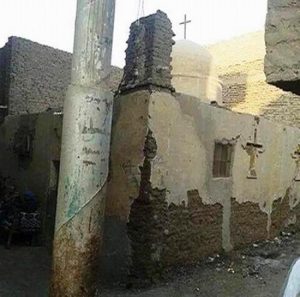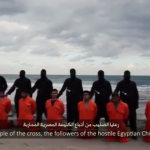By Raymond Ibrahim – Exclusive for Coptic Solidarity

The dilapidated Virgin Mary Church in Gala’, Egypt
It is one thing for Egyptian President Sisi not to be able to prevent surprise Islamic terror attacks against Egypt’s Christians, the Copts. But what does one make of the fact that his own government—police, local authorities and courts—also discriminate against and persecute the Copts?
Most recently, a court sentenced 19 Muslim defendants to a one-year suspended sentence for attacking an unregistered church near Giza last December 22. Then, dozens of Muslim rioters had gathered outside the building; they eventually stormed it and “destroyed the church’s contents and assaulted Christians inside before security forces arrived and dispersed them.”
Based on this sentencing (from a misdemeanor court no less), the defendants are not required to serve prison time unless they get into trouble again. On the other hand, a Coptic Christian defendant was fined 360,000 Egyptian pounds (about $20,383) for setting up the unlicensed church.
The court’s logic is that, by using an unregistered building as a church, this entire incident is the Copt’s fault—for aggrieving local Muslims. Meanwhile, the well-known fact is that getting a church permit in Egypt is as difficult as getting a mosque permit is easy—and explains why havoc ensues when Copts merely try to renovate their churches, while ten mosques are opened every week. In other words, if the government did not make it so difficult for Copts to congregate and worship, they would not need to resort to using private homes and unregistered buildings.
This is hardly the first such incident to reflect the Egyptian authorities’ flagrant double standards. Muslim uprisings based on Copts meeting in private homes to worship or using unregistered buildings—with local officials ultimately siding with violent Muslim rioters—is a common occurrence in Egypt. For example, last summer in the village of Kom al-Loufy in Minya, where some 1,600 Copts have for five years been trying to reopen their church, Muslims rampaged through the village, burning Christian homes to the ground on a rumor that Copts were using one of the homes to meet and pray in.
In Sohag City, a similar chain of events took place. After waiting 44 years, the Christians of Nag Shenouda were issued the necessary permits to build a church in 2015. According to a report, local Muslims rioted and burned down the temporary worship tent. When a Christian tried to hold a religious service in his home, a Muslim mob attacked it. Denied a place to worship, the Christians of Nag Shenouda celebrated Easter in the street.
Also after waiting years, the Christians of Gala’ village finally received formal approval to begin restoring their dilapidated church (see pictures here). Soon thereafter, on April 4, 2015, Muslims rioted, hurling stones at Christian homes, businesses and persons. Christian-owned wheat farms were destroyed and their potato crops uprooted. The usual Islamic slogans were shouted: “Islamic! Islamic!” and “There is no God but Allah!”
Another church under construction in Swada village of Minya was attacked by a mob consisting of at least 400 Muslims believed to have been incited by local officials. After the attack, and although the church had obtained the necessary permits required for construction, it was closed by the same officials. Although comprising approximately 35% of Swada village, the 3,000 Coptic Christians there don’t have a single Coptic Orthodox Church to serve them.
As in the most recent case from Giza, Muslim judges in all of the above incidences—and there are many more—gave Muslim vandals and rioters at most a “slap on the wrist,” while forcing the victims to pay penalties and sometimes even serve jail time.
Much of this is consistent with the World Watch List 2018, which ranked Egypt the 17th worst nation in the world wherein to be Christian. It found that “officials at any level from local to national” are “strongly responsible” for the oppression of Egypt’s Coptic Christians. “Government officials,” the report adds, “also act as drivers of persecution through their failure to vindicate the rights of Christians and also through their discriminatory acts which violate the fundamental rights of Christians.” While authorities themselves are sometimes the persecutors—as when Muslim soldiers beat Christian soldiers to death on account of their faith, most recently in July 2017—they more often function as enablers, allowing a culture of impunity to thrive.
All this again begs the question: whereas it may be understandable that Sisi cannot eliminate terrorism—after all, terrorists operate surreptitiously and work “in the shadows”—what about the fact that his very own government (police, local authorities, courts and judges) is openly biased against the Copts—and right under his nose?





